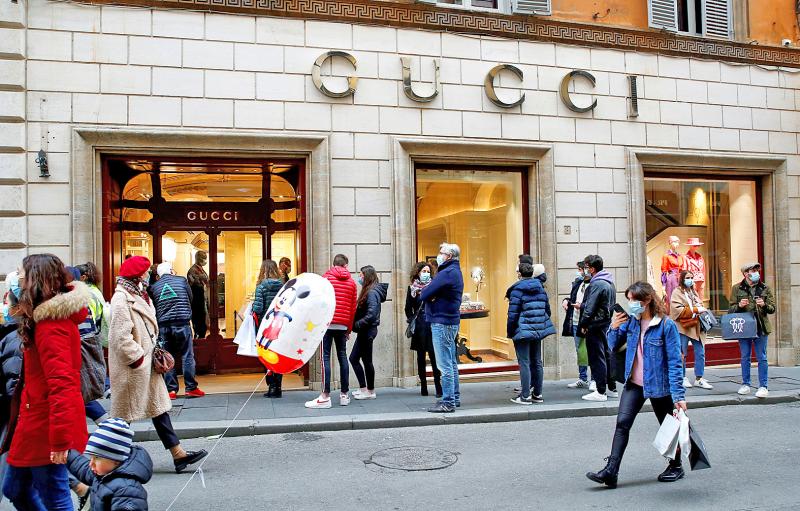Gucci sales fell for a fourth quarter, ending years of expansion as the luxury brand and growth motor of the global luxury group Kering struggled amid renewed COVID-19 lockdowns in Europe.
Revenue at the Italian luxury brand dropped 10 percent on a comparable basis to 2.28 billion euros (US$2.75 billion) in the three months through December, Kering said yesterday.
Analysts had expected a 7.2 percent decline.

Photo: Reuters
Gucci has been reducing its wholesale footprint as it bets this strategy would enable it to better control its image, as well as the pricing of its leather handbags and other items.
Analysts warned this move would hit revenue in the final three months of last year, but was the right decision for the longer term.
The luxury brand was also hurt by renewed lockdowns in Europe that shut stores during the period.
In a call with reporters, Kering chief financial officer Jean-Marc Duplaix said that negative trends continued in the region at the start of the year.
“Today’s statement is likely to be viewed negatively by the market,” Morgan Stanley analyst Edouard Aubin wrote in a note. “The miss at Gucci is entirely coming from retail.”
Gucci’s retail store sales fell 7.5 percent in the fourth quarter.
The pandemic brought an end to years of soaring growth at the Italian brand, which posted an annual revenue just shy of 10 billion euros in 2019.
Under the leadership of chief executive officer Marco Bizzarri and creative director Alessandro Michele, revenue more than doubled from 2015 to 2019.
The brand’s popularity on Instagram — the go-to social media platform for fashionistas — also boomed, with followers outnumbering those of rival Louis Vuitton.
Still, Gucci has sometimes been seen as too ostentatious, especially during pandemic times when consumers might be less keen to buy conspicuous items. While the brand is extremely popular in China, in Europe its client base is weaker, even though it is to celebrate its 100th anniversary this year.
The brand plans various actions for this anniversary, Duplaix said.
Kering carried out two phases of price increases on Gucci products last year, including in October, Duplaix said.
With sales growing in China as travel globally is restricted, luxury brands have been raising prices there. That has closed the gap with Europe, where tourists from that country used to splash out during visits.
“We are pretty satisfied with the price differential we have between regions nowadays,” he said, adding that there is room for “tactical” hikes when they are needed.
Meanwhile, Kering’s Bottega Veneta brand saw comparable revenue jump 16 percent in the period.
Analysts had expected a gain of 19 percent.
The brand has found success with some items, notably a padded leather cassette bag with a thick golden chain.
Kering’s annual recurring operating income fell 34 percent to 3.14 billion euros, beating analysts’ estimates of 3.08 billion euros.

Taiwanese suppliers to Taiwan Semiconductor Manufacturing Co. (TSMC, 台積電) are expected to follow the contract chipmaker’s step to invest in the US, but their relocation may be seven to eight years away, Minister of Economic Affairs J.W. Kuo (郭智輝) said yesterday. When asked by opposition Chinese Nationalist Party (KMT) Legislator Niu Hsu-ting (牛煦庭) in the legislature about growing concerns that TSMC’s huge investments in the US will prompt its suppliers to follow suit, Kuo said based on the chipmaker’s current limited production volume, it is unlikely to lead its supply chain to go there for now. “Unless TSMC completes its planned six

Intel Corp has named Tasha Chuang (莊蓓瑜) to lead Intel Taiwan in a bid to reinforce relations between the company and its Taiwanese partners. The appointment of Chuang as general manager for Intel Taiwan takes effect on Thursday, the firm said in a statement yesterday. Chuang is to lead her team in Taiwan to pursue product development and sales growth in an effort to reinforce the company’s ties with its partners and clients, Intel said. Chuang was previously in charge of managing Intel’s ties with leading Taiwanese PC brand Asustek Computer Inc (華碩), which included helping Asustek strengthen its global businesses, the company

Power supply and electronic components maker Delta Electronics Inc (台達電) yesterday said second-quarter revenue is expected to surpass the first quarter, which rose 30 percent year-on-year to NT$118.92 billion (US$3.71 billion). Revenue this quarter is likely to grow, as US clients have front-loaded orders ahead of US President Donald Trump’s planned tariffs on Taiwanese goods, Delta chairman Ping Cheng (鄭平) said at an earnings conference in Taipei, referring to the 90-day pause in tariff implementation Trump announced on April 9. While situations in the third and fourth quarters remain unclear, “We will not halt our long-term deployments and do not plan to

The New Taiwan dollar and Taiwanese stocks surged on signs that trade tensions between the world’s top two economies might start easing and as US tech earnings boosted the outlook of the nation’s semiconductor exports. The NT dollar strengthened as much as 3.8 percent versus the US dollar to 30.815, the biggest intraday gain since January 2011, closing at NT$31.064. The benchmark TAIEX jumped 2.73 percent to outperform the region’s equity gauges. Outlook for global trade improved after China said it is assessing possible trade talks with the US, providing a boost for the nation’s currency and shares. As the NT dollar